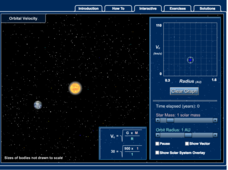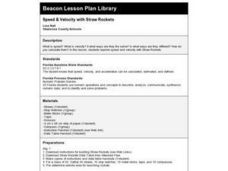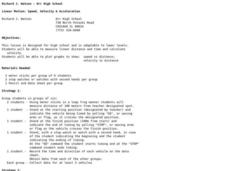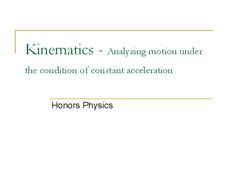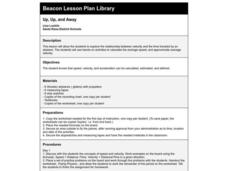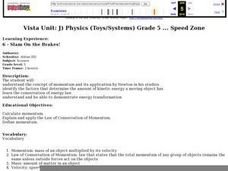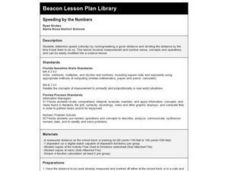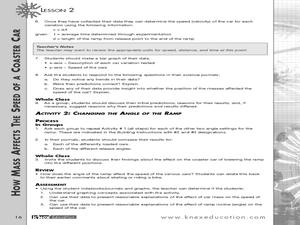McGraw Hill
Orbital Velocity Interactive
Why does it take Pluto 90,000 days to orbit the sun, but it only takes Mercury 88 days? An interactive lesson helps pupils find a connection between the speed of orbit and distance a planet is from the sun. The simulation allows for...
Curated OER
Speed & Velocity with Straw Rockets
Eighth graders explore calculating speed and velocity with Straw Rockets.
Curated OER
Linear Motion: Speed, Velocity & Acceleration
Students explore the concept of linear motion. In this linear motion lesson, students calculate distance and time in order to calculate average speed and velocity in the provided problems.
Curated OER
Motion: Speed, Velocity, Acceleration and Networking
Young scholars interpret a variety of motion graphs. In this physics lesson, students calculate the speed and acceleration of objects using numerical data from graphs. They apply what they have learned to solve real world problems.
Bowels Physics
Kinematics
Lead your class on a speedy journey as you present an effective lesson on kinematics. Individuals review speed, acceleration, and velocity before completing several practice problems to integrate the concepts.
Curated OER
Speedy Spaghetti
Students explore the principles of motion by constructing a car out of pasta that will carry a large marshmallow and travel down a ramp. They discuss the formula for calculating speed, design and build their cars, and calculate their...
Curated OER
Motion
Sixth graders read about and study motion. They conduct a lab in which they calculate speed using track records at their school. They graph the results and then invite a guest speaker (an officer from the local police department) who...
Curated OER
Up, Up, and Away
Students study the concepts of speed and velocity and complete practice problems. In small groups, students fly airplanes and record time and distance traveled for each flight. They calculate the speed and velocity of their plane for...
Curated OER
Going the Distance
Students experiment in small groups to answer the question, "Is there a relationship between ramps and speed?" They apply a formula to calculate the speed of the cars used in the experiment, complete the associate lab report, and...
Curated OER
Slam On the Brakes!
Fifth graders study the concept of momentum and its application by Newton in his studies. They view a demonstration and complete an experiment with toy cars on a racetrack that shows them the properties of momentum and how velocity and...
Physics Classroom
Action-Reaction Lab
Computer-interfaced motion detectors are required to carry out this inquiry. It is a new twist on exploring motion with plunger carts: they are set back-to-back and then propelled away from each other. Their velocities are measured, and...
Curated OER
Elevator Height as Integral of Velocity
Pupils investigate integrals and their relationship to velocity in this calculus lesson. They use the idea of a moving elevator to explore vertical motion and use the TI to help them create a visual.
Curated OER
Velocity, Acceleration, and Gravity
Students perform an experiment where a string is tied across the room. A straw is threaded onto the string, and a balloon attached to the straw. Students determine the speed of the balloon as it moves across the string. They repeat the...
Curated OER
I Feel The Need For Speed
Pupils are introduced to the concepts of speed, velocity, acceleration and inertia. In groups, they use the internet to research rollercoasters found in the United States and calculate their acceleration rates. They use the...
Curated OER
Speeding By The Numbers
Students determine speed by running or walking a given distance and dividing the distance by the time it took them to do so. They record their average speed and compare it with the speeds of other moving objects.
Curated OER
Velocity
Students explore the concepts of velocity, acceleration, distance and football. They collect data on the velocity of a football and they determine the distance and height of a football when it is thrown. Students compare their findings...
Curated OER
Can You Calculate the Speed of Your Pet?
Students analyze the formula for speed and velocity. They explore and demonstrate how to calculate the speed of wind up toy pets, average the speeds and identify the correct units of measure of speed.
Curated OER
The UPS Experiment
Students calculate the speed using metric measurements. In this geometry lesson, students calculate speed, distance and velocity using metric measurements. They gain inquiry and problem solving skills in this assignment.
Curated OER
How Mass Affects the Speed of a Coaster Car
Students determine what factors affect the speed of the car. In this physics lesson, students calculate speed, velocity and acceleration from experimental data. They construct and interpret motion graphs.
Curated OER
Speed of Sound
Students investigate the concept of velocity and apply it to the velocity of sound and measure the velocity of sound by measuring the echoes produced in a tube. They show their calculation of time and speed, and then conclude that sound...
Curated OER
Straight Line Motion with a Stomper
Students explore average speed, and graph distances and time. In this speed and velocity instructional activity students complete a lab then calculate distances, acceleration and velocity and graph the data.
Curated OER
Graphing Your Motion
Seventh graders investigate velocity and speed. For this Vernier Probe lesson, 7th graders will use probes to calculate motion, speed, and velocity of an object. They will create a graph of their collected data.
Curated OER
Don’t Sit Under the Apple Tree…You Might Become Famous
Students explore Newton's laws using CEENBoTs. In this physics lesson, students collect data and create tables and graphs. They calculate speed, acceleration and forces using mathematical formulas.
Edmond Public Schools
8th Grade Science Resource Book: Unit 2 - Physics
Get things moving with this extensive collection of physical science resources. Covering the fundamentals of measurement, graphing, lab safety, and experimental design as well as the specific scientific concepts...
